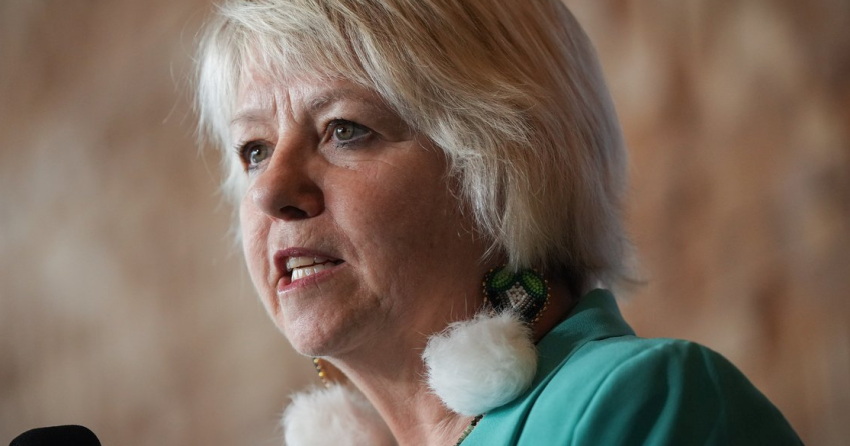Provincial Health Officer Dr. Bonnie Henry has said she’s worried that British Columbia has entered “a phase of collective forgetting” about the COVID-19 era.
Asked at a press conference this morning whether she had reflected on her role in the pandemic – in light of criticisms from the Conservative Party of BC, whose leader has pledged to fire her – she said she had thought about that time “a lot.”
Dr. Henry was asked specifically whether she managed to strike the right balance between preserving civil liberties and getting through the pandemic.
“I worry a little bit that we’re in a phase of collective forgetting, which is not uncommon after a major traumatic event,” she said.
“All of us want this to be behind us and not have to think about this anymore.”
She added: “I have done a lot of reflection about the things that we did to try and manage during times of great uncertainty, and I think we have to remember that. We did what we did to try and find that balance.”

Some of the controversial policies introduced in BC during the pandemic included various vaccine mandates, closing schools, restrictions on gatherings and forced mask-wearing.
She has been named in numerous court filings since issuing the health orders, including over the now-rescinded vaccine mandate for health workers. In one case in May, a judge ruled the orders infringed upon citizens’ Charter rights, but that the infringement “was reasonable in the circumstances.”
Dr. Henry, speaking today, said there were “extreme harms caused” by COVID-19, particularly among older people and those with weakened immune systems. According to official government data, just under 61,000 people have died from COVID-19 across Canada, with more than 7,300 of those in BC.
“But we also know the impact of the measures that we put in place had differential negative effects on younger people particularly,” she said. “I’ve talked about this many times, about the concerns I have about young people in their late teens and early 20s and the opportunities they missed.”
She added: “My role, our role, was to try and find that balance of protecting people as best we can, and the one thing that I’m absolutely, absolutely certain of is the fact that the vaccines that we had and the ability to provide protection through immunization is what got us through this pandemic, what made it so that we could live with this virus and stop some of the restrictions that were necessary at a time when we didn’t have the protection from vaccines.
“It’s hard, at this point, to remember some of the trying and uncertain times that we went through, but my role, and the role of public health, was to find that balance as best we could.”
Later in the press conference, Dr. Henry also said there remain a “small number of people” working in health care who are not keen on the COVID-19 vaccines, though the “vast majority” have taken them and are happy to administer them.
She also said, when asked about whether she’s concerned she could be fired by a potential Conservative government, that it’s the “prerogative” of elected officials to replace her with another provincial health officer.
Dr. Henry had called the conference to reveal that record numbers of people in BC are being vaccinated against COVID-19 and flu as the province ramps up its immunization campaign for respiratory illness season.
She – and the health ministry, in a news release – said that invitations for priority populations started going out on Oct. 8, and on the first day of delivery on Oct. 15, BC pharmacies administered almost 82,000 vaccinations.
Dr. Henry said that was a record for any single day, with about 50,000 shots for the flu, and about 32,000 for COVID-19.
The ministry, meanwhile, said there are updated vaccines for both influenza and COVID-19 on offer, including new mRNA vaccines for the so-called KP.2 COVID variant.
The first week of the campaign also set a record, with almost 370,000 vaccines administered.
Dr. Henry said respiratory illness season is a time to remember "healthy habits" including covering coughs, washing hands, avoiding others if you have a cough or fever and wearing a mask if you have lasting symptoms or need more protection.
The ministry said the National Advisory Committee on Immunization recommends people get the updated COVID-19 vaccine this fall, or six months after their most recent COVID-19 vaccine or infection, whichever is later.
Henry said the province has seen "sporadic" cases so far this year of flu and respiratory syncytial virus, or RSV, going back to what would be considered "a more normal pattern" from before the pandemic.
"I expect that we're going to start seeing influenza and RSV start to increase, probably late November, early into December, seeing the patterns that we're seeing now," she said.
"But COVID-19 remains elevated. It was elevated through the summer. It never did go back to what we would call a seasonal spread. We had a slight increase in the spring, and it levelled off a little bit in the summer, but we're starting to see that increase again."
She said virus levels in wastewater remain high at many sites and hospital admission rates are "elevated," though they "levelled off a little bit in the last little while."
"So, that tells us, again, that we still don't know enough about the patterns that these viruses are going to have long-term in this province and in these countries. Again, it remains really important for us to have that increasing protection, particularly people who are more at risk of severe illness," she said.
The health ministry says the National Advisory Committee on Immunization recommends people get the updated COVID-19 vaccine this fall, or six months after their most recent COVID-19 vaccine or infection, whichever is later.
Dr. Henry emphasized the province is no longer in an emergency situation largely because vaccines are protecting people.
"But we don't know for certain the patterns that we're going to see long term, whether it's going to require a booster every year, or whether it might slow down the changes that we're seeing in the virus and not need to have a booster for a longer period of time," she said.
While there's still some uncertainty around COVID-19, Henry said they know it's going to be around for the long term.
"We need to be prepared for that. And thankfully, we have good vaccines that help protect people, particularly from the more severe illness."
– With files from Canadian Press

















